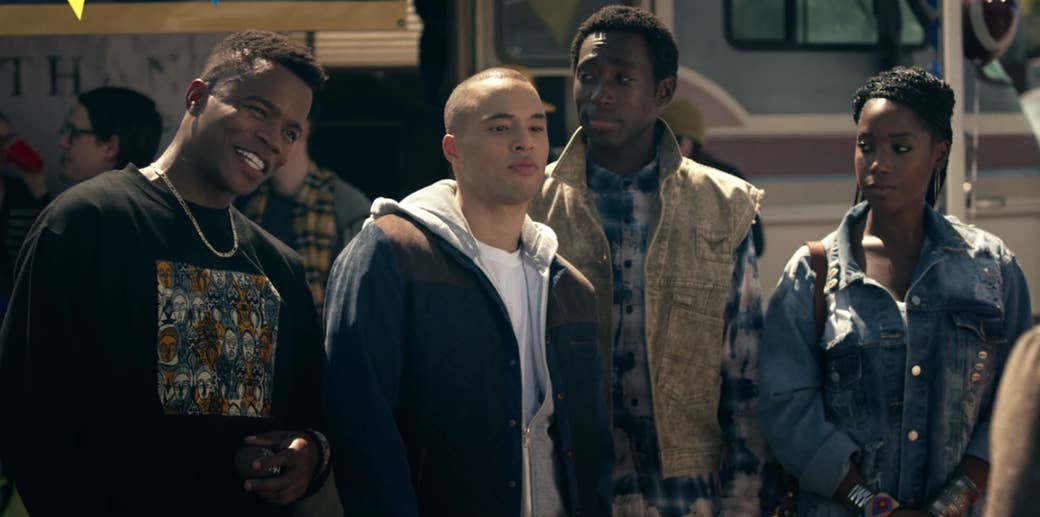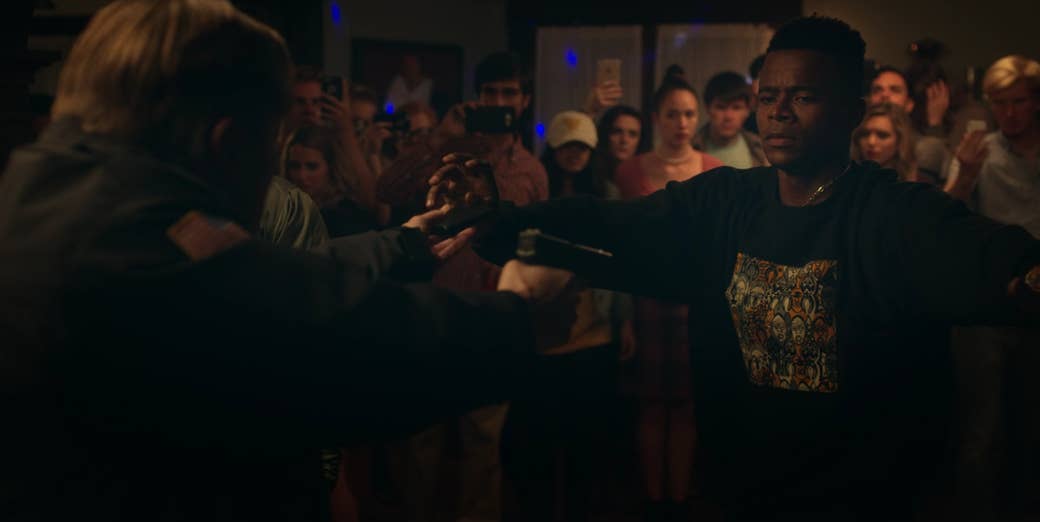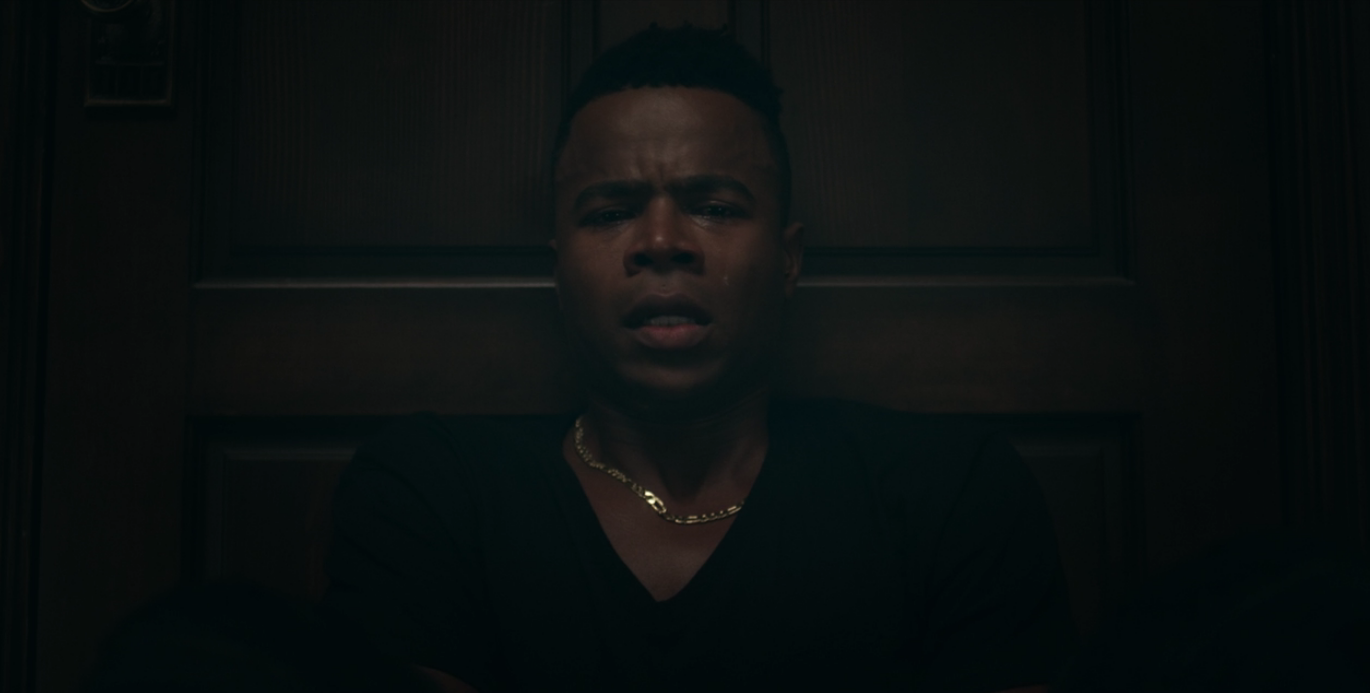
Season 1 of Netflix’s Dear White People doubles down on the original 2014 film’s witty portrayal of the black experience at an Ivy League college. It manages to be as entertaining as it is captivating, even while the characters navigate serious issues like blackface, colorism, and racism. But all of that comes to a halt in the last few minutes of Episode 5. There are no jokes, no witty quips; just a white campus security guard with a loaded gun pointed toward one of the show’s lead characters, Reggie Green (Marque Richardson).
“I was always clear that the fifth episode at the very end, some shit had to go down that completely recontextualized the way you watch the rest of the season,” Dear White People creator Justin Simien told BuzzFeed News. “I wanted to catch you off guard with the fact that these characters are black. I know you're having fun, but the black experience goes here for all of us and this is part of what happens when you follow young black kids. It's just a part of life, unfortunately.”
Ironically, the episode starts with the squad attempting to get Reggie to take a break from strategizing about how to make sure racist incidents — like a blackface party — don’t happen again on campus. They just want him to enjoy a fun Saturday on the town because, as Joelle (Ashley Blaine Featherson) puts it, “sometimes being carefree and black is an act of revolution.” However, by the end of the episode, the group is reminded that the movement, much like their black skin, isn’t something that can be turned on or off. They are both the subjects and proponents of it, even when they’re at a party just trying to enjoy a Future song.
“Just don’t say 'nigga,'” Reggie tells his white friend Addison (Nolan Gerard Funk) while they’re dancing to “Trap Niggas.”
“I guess it just kind of felt weird to censor myself,” Addison responds after insisting he’s not racist for repeating the word when it’s in a song. “It felt kind of weird to hear you say it,” Reggie tries to explain. But soon, things escalate, others get involved, the music stops, and the situation gets tense enough for someone to call campus police.
When they arrive, one officer singles out Reggie and asks him to prove he's a student at the show's fictional Winchester University by showing his ID. “Why do you need to see my ID?” Reggie asks. Several other students, including Addison, whose house it is, tell the officer that Reggie is indeed a student. But that's not enough for the officer, who continues to insist Reggie, and only Reggie, show him some identification.
Annoyed and offended, Reggie exclaims, “Fuck these pigs, man.” The officer responds by immediately drawing his gun and aiming it at Reggie. “I said show me some ID,” he yells.

“I’ve never had a gun pulled out on me before,” Richardson told BuzzFeed News. “After I read the script in its entirety for the first time, I went home and cried over what was about to happen because it’s so real and so authentic. And I kept thinking about my nephew, who was 1 1/2 at the time, and the fact that he’ll grow up in this world with this being a reality. It just broke my heart.”
Simien said the scene is something the writers fought about “from day one." “There were moments when some people wondered if that had been done, like, ‘Haven't we dealt with that subject?’" he said. "But to do a show that's supposed to be about the black experience and not go there felt so irresponsible.”
The familiarity of the moments that follow the officer drawing his gun on Reggie only echoes Richardson's and Simien’s points. Viewers see what plays out on the news and, for some audience members, in real life: Everyone in the crowd freezes; some cry; more plead with the officer to stop and with the black man in front of the gun to just do whatever he’s being asked to do, while others pull out their cell phones and begin to film videos that could go viral if the situation turns fatal.
“It's fatal to be black. That is the reality of our country."
Meanwhile, Reggie goes through the instructions black boys are taught from the moment they’re old enough to be seen as threatening: He puts his hands in the air and announces his movements as he slowly reaches back to his wallet, because any sudden shift could end his life, just like it did Tamir Rice's and Mike Brown's.
On Dear White People, Reggie Green doesn’t become a hashtag, but everyone in the room — and everyone watching at home — is once again made painfully aware of how easy it is for a black person to become one.
“We're in an era where people confuse bigotry and prejudice with racism,” said Simien. “They're different things. The reason it's important to say that and call that out is because people who are oppressed by racism die. It's fatal to be black. That is the reality of our country.”
The episode ends with the most harrowing (but also gorgeous) shot of Reggie at the foot of his door crying, while Sam (Logan Browning) knocks on the other side, trying to get him to open up, both literally and figuratively. The camera zooms in slowly until Reggie makes eye contact with it, breaking the fourth wall and driving home the point that fiction this is not. That's because Barry Jenkins, the Oscar-winning Moonlight director and master of an emotional close-up, helmed the episode.

“Barry is a phenomenal human,” said Richardson. “He’s so cool, so specific about what he wanted. There were things that Barry, Justin, and I didn’t even have to communicate — just from our experience of being young black men. It was like a mind meld. In one of the scenes, he told me ‘just give me a little more R&B on it’ and I knew exactly what he was talking about. … Working with him was an experience that changed my life.”
Reggie's storyline is one Simien has been wanting to tell since he started working on the feature film version of Dear White People. But it feels all the more relevant now. "That episode, which is a turning point for the whole series, was a scene in the feature that I always loved but had to cut because it didn't move the narrative," he said.
Should Netflix renew the series for the second season, Simien hopes to explore the storyline even more. "I have so many of those scenes left," he said. "So many scenes I just had to scuttle into the vault that didn't fit in the movie and didn't fit in the first season, but I'm dying to go there."
Jarett Wieselman contributed reporting to this story.
